A Call to Serve Virginia’s Autism Community, at Home
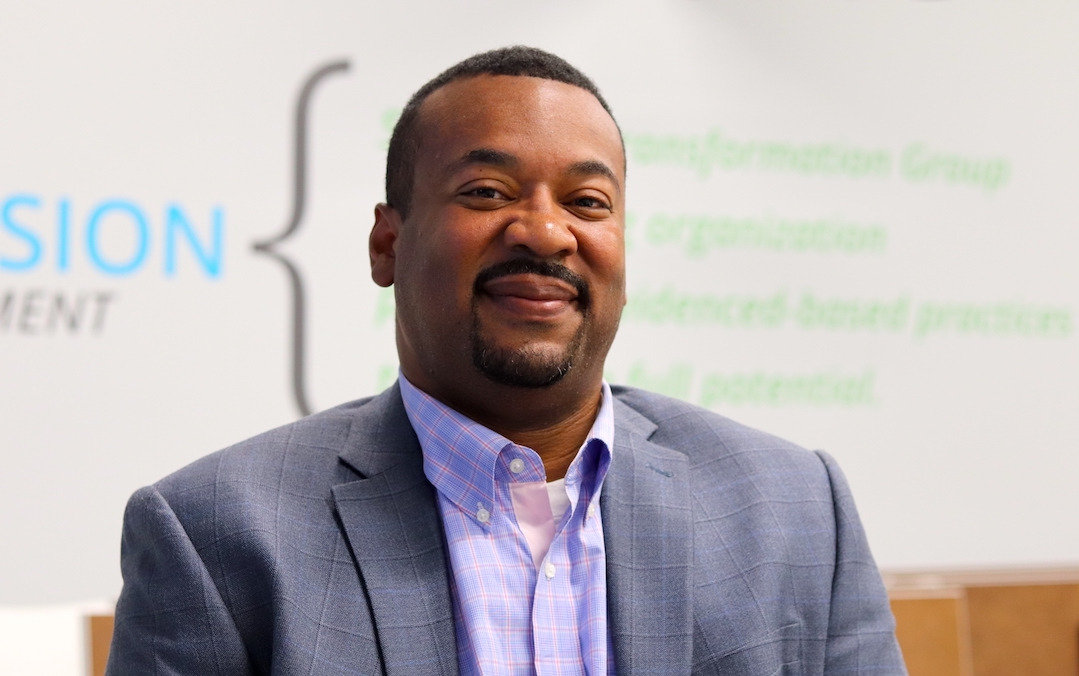
“I’m a kid that grew up in the north side of Richmond, one of the toughest parts of Richmond when I was growing up,” says Dr. Cedric Moore. “And it was my community, which helped shape me, to help me become who I am today and who I continue to try to aspire to be.”
Moore has risen far indeed. He is now the CEO of Spectrum Transformation Group, the first organization licensed in Virginia as an intensive outpatient Applied Behavior Analysis (ABA) service. Also a member of the Virginia Council of CEOs, Moore is supported by a local roundtable group as he implements his strategic plan for Spectrum and navigates various business challenges, including the pandemic.

Listen in as Moore talks about his business, social work, challenges facing minority business leaders, and his new-found home a VA Council of CEOs (Captions available)
Moore’s journey out of the city led to a bachelor’s degree in Social Work from Eastern Mennonite University, an MBA, and later a doctorate in strategic leadership from Regent University. He then returned to Richmond and launched Spectrum in 2010. Still, he admits that before joining VACEOs, he sometimes felt unheard or unacknowledged when in a room of non-minority business leaders.
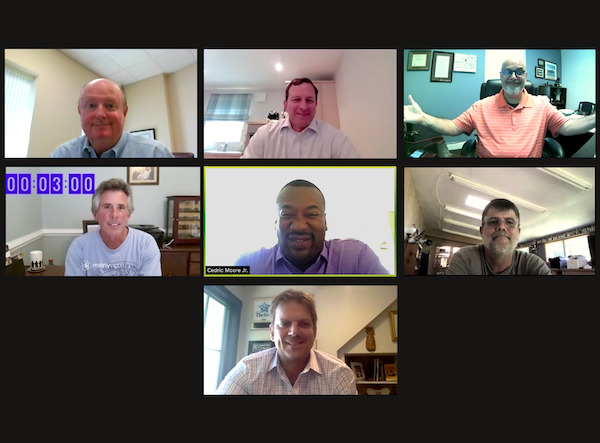
“There were times where, you know, I had to speak a little louder or there were individuals who wouldn’t call on me in a meeting,” he explains. “Those are some things that we face as minorities, even with a terminal degree.”
“I’m very aware sometimes that I’m invited to the table, but I’m not actually welcomed at the table,” he says. “But I understand now that I’m happy to embrace this role and be able to help other minorities, as well to get them a seat at the table. I’m fortunate enough to find the Virginia CEOs and be able to work with Scot [McRoberts, VACEOs executive director].”
“It’s an ability to not only to survive things like the pandemic but also to come out of the situation a lot better. So everyone is there to help each other. I’m so happy, so proud to be a part Roundtable 17. It’s just been great.”
Dr. Cedric Moore, CEO, Spectrum Transformation Group
He elaborates on his VACEOs roundtable peers, “these groups, I mean, they really care about you as a person and they care about your business. It’s an ability to not only survive things like the pandemic but also to come out of the situation a lot better. So everyone is there to help each other. I’m so happy, so proud to be a part Roundtable 17.”
Carrying the Banner for In-home Autism Services
How did Spectrum come to be? “I want to help people. That’s what we do, social work,” Moore explains. “My wife had a passion with autism and that was huge for us.”
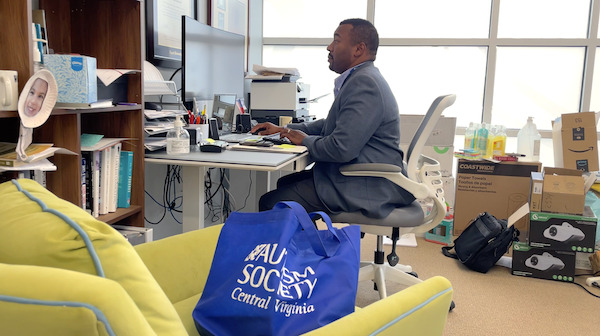
“We met with her mentor, psychology professor Donald Oswald, who is a guru on the East Coast within autism spectrum disorder services,” he says. “That drove us to provide services for a population at the time that there wasn’t much there other than educational services.”
At Spectrum, a team of 52 full-time employees—including psychologists, psychiatrists, behavior analysts and technicians, and speech and language pathologists—provides general mental health diagnoses and a variety of services, such as outpatient therapy.
“We are happy to carry a banner with being the first licensed program in the state to provide those services in the home,” says Moore.
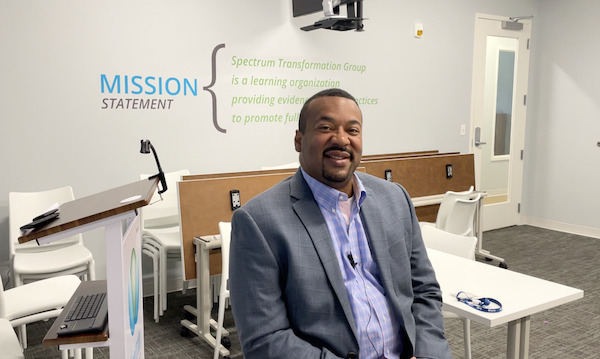
A Future of Service, Family, and Faith
Adapting to a pandemic was especially challenging for an organization whose clients rely on face-to-face interaction. “So going to a telehealth platform made it really difficult. Some of their attention spans are a lot shorter than their peers. Some of them can’t sit for a very long period of time,” explains Moore.
In response, the company redesigned and reconfigured offices, common areas, and therapy spaces to comply with CDC safety guidelines and enable in-person services. “Our ability to be able to pivot was definitely important as we continue to try to meet the needs of those that we serve,” says Moore.
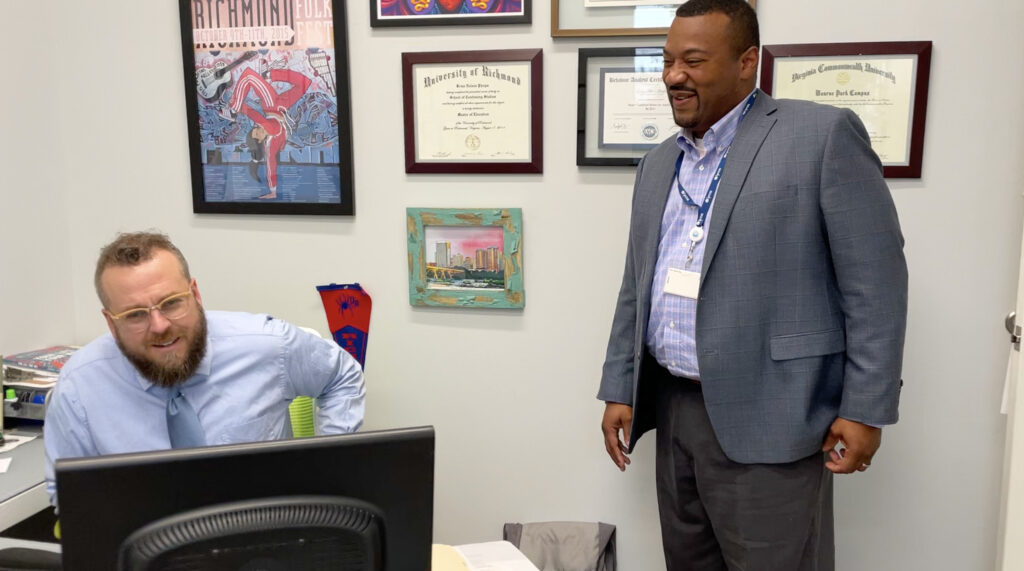
What’s next for Spectrum? The company is implementing phase three of its strategic plan and is bringing on psychiatrists and nurse practitioners. “It’s super exciting. It’s a new learning experience for me,” says Moore.
As important as Moore’s business goals, however, are his family and his faith. “I grew up with a single mom and my ability to be there for my children, it’s very important to me. My ability to be there for my wife is very important to me. And my ability to be able to serve God as best as I can is important to me. So every day I’m just trying to be better than what I was the day before.”
VA Council of CEOs Names Mike Matthews, Elissa Mast, and Connie Hom as Charles E. McCabe Leadership Award Winners
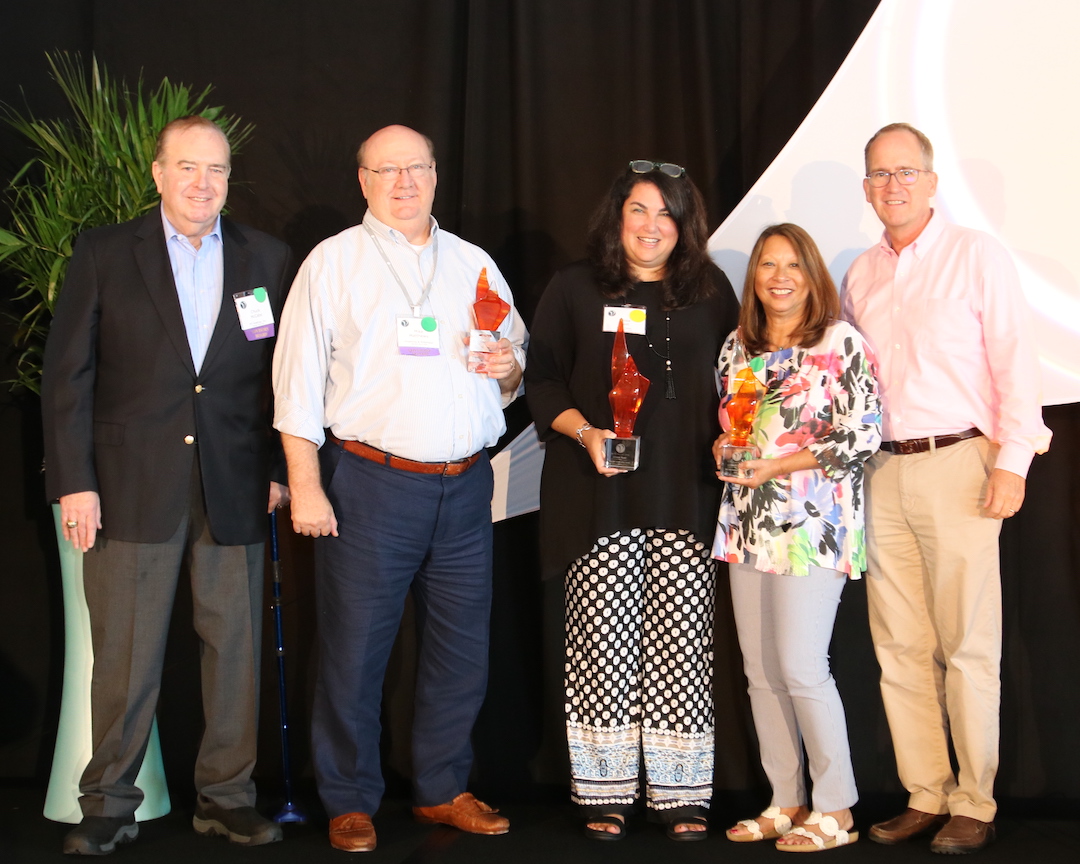
Recipients honored for their tireless work as VACEOs volunteers and for unwavering dedication towards sustaining the mission and the growth of the Council.
Richmond, Virginia: The Virginia Council of CEOs (VACEOs), a non-profit association serving more than 200 small and mid-sized business owners, announced today that three members were awarded the Charles E. McCabe Leadership Award on September 20, 2021 at the 1st Annual VACEOs Fall Leaders Conference held at the Marriott Virginia Beach Oceanfront in Virginia Beach.
The Charles E. McCabe Leadership Award, presented by the Virginia Council of CEOs Board of Directors, recognizes VACEOs members who make significant leadership contributions to the Council. Chuck McCabe, CEO of Peoples Tax and The Income Tax School, was appropriately named as the first recipient of the award during the 2017 VACEOs Retreat.
“Volunteers are a core strength of our organization. I am humbled by their dedication,” said Scot McRoberts, Executive Director, VA Council of CEOs. Adding, “These honorees represent many others who apply their talents and energy to connect CEOs across Virginia for learning and growth.”
As last recipient of the award in 2019, Arlene Lee, CEO, Lee Construction Group, was given the honor of introducing each new recipient.
Mike Matthews, President of Froehling & Robertson, was celebrated for his efforts in shaping the VACEOs Forum program and more.
Said Lee during the ceremony, “He was a member of our first CEO Forum for larger company CEOs, and helped shape that program. He served as leader of his Forum, on committees, the board of directors, as Treasurer, Vice Chairman, and finally as Chairman in 2016.
When Mike Matthews had a very successful business exit, and during his brief early retirement, Mike was a fantastic facilitator for a couple of our CEO Forums. He has since gone back to a full-time president role, but continues to serve VACEOs as chairman of the Finance Committee. Thank you and congratulations Mike Matthews.”
Elissa Mast, President, E&R Sales, has been a member of the Council since 2005 and was honored for her active role within the Council and especially her impact on the Annual Retreat.
About Mast, Lee said, “Elissa Mast joined VACEOs 16 years ago to solve her ‘lonely at the top’ issue, and boy are we glad she did. In addition to speaking up at every meeting she ever attended, Elissa has led her roundtable, launched our Knowledge Network luncheons – where the experts are in the room – and served on the board of directors for nearly a decade. Perhaps her greatest impact has been in chairing several Retreats, where she raised the bar on content and speakers for us all.”
And finally, Connie Hom, CEO of Buckingham Greenery, was celebrated for her dedication towards promoting and advancing the Council.
“This leader joined VACEOs in 2002. She has led her roundtable, served on nearly every committee, and on the board of directors since 2018. As a leader and active member in a host of business and community organizations, she has leveraged her network to advance the Council. Connie Hom always provides live plants to decorate our stages, and we are healthier for it!
For years, Connie has spread word of the Council to other CEOs, enthusiastically participated and promoted our programs, and served our association in so many ways large and small. Congratulations, and thank you Connie Hom for nearly 20 years of leadership,” said Lee.
Charles E. McCabe Leadership Award Recipients (Past and Present)
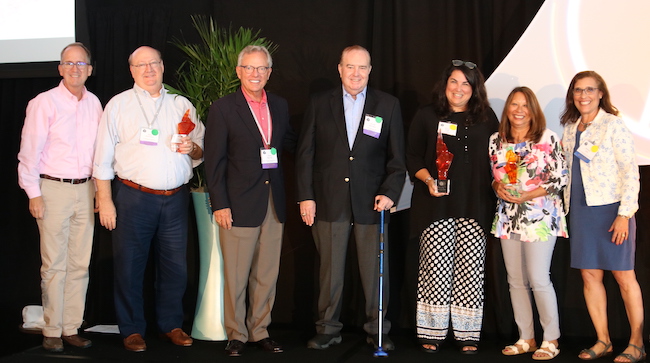
2021: Mike Matthews, President, Froehling & Robertson; Elissa Mast, President, E&R Sales; Connie Hom, CEO of Buckingham Greenery
2020: (Postponed due to Coronavirus)
2019: Arlene Lee, President, R.E. Lee Companies
2018: David R. Barrett, President and CEO of Barrett Capital Management
2017: Chuck McCabe, CEO of Peoples Tax and The Income Tax School
Our “Post-COVID” World: Returning to the Office
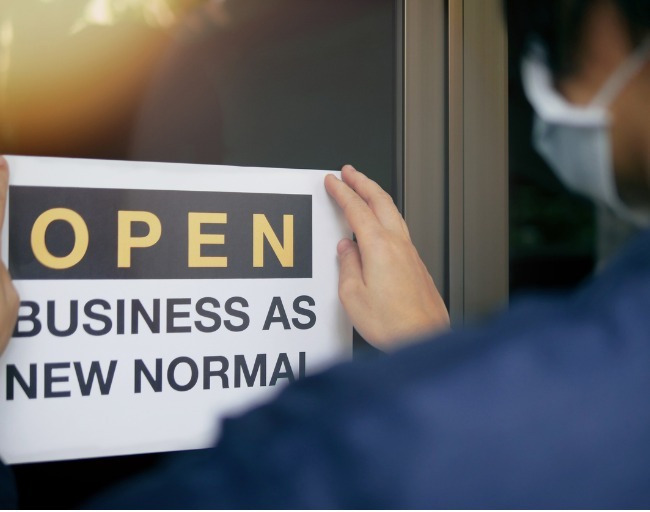
In March 2020, the business world went virtual. Offices closed, desks emptied, and the break room went silent. Now, more than a year later, your business might have already brought employees back to the office or have plans to do so soon.
As your employees come back, it’s important to remember one thing: COVID isn’t necessarily over. That’s why “Post-COVID” is in quotation marks in the title of this article. Yes, case numbers, hospitalizations, and deaths have declined dramatically since the start of the vaccination effort. That’s what is allowing companies to reopen their offices.
But COVID is not completely over, nor is it going away entirely. This fall, you may need to deal with a surge in cases driven by a variant. Or your operations may be affected by the need for a booster vaccine. As your employees return to in-person work, here are a couple things to keep an eye on.
Recommendations For Your Business: It Depends On The Details
Your employees’ degree of comfort, and the specific health recommendations we can make, will vary by business. In general, the more people – especially indoors – the greater the risk. The fewer people vaccinated or unknown, the greater the risk. The more vulnerable the potential recipient, the higher the risk.
In Virginia, we have been lucky to enjoy relatively low active COVID levels combined with relatively high vaccination (at least through July 2021 when this was written). Of course, that may change as variants emerge and we head into the fall, when we reasonably expect the prevalence of respiratory illnesses, like COVID or influenza, to increase.
Keep an eye on case numbers and the percentage of those being tested in your area. As they increase, the risk to your employees increases and your business should, at the very least, be prepared to make adjustments once again.
Mental Health: The Stress Remains
We are returning to our new normal, but that doesn’t mean the lasting effects of COVID have dissipated. The past 18 months or so have been hard for a lot of people.
Many have suffered losses of loved ones. Many have had enormous challenges in balancing professional and family responsibilities. And as your employees return to the office, they will face more stress related to kids and other family members, especially as children return to school in the fall.
Managing your employees’ everyday stress will be one of your primary challenges. A few months ago, 84% of adults reported feeling at least one emotion associated with prolonged stress (anxiety, sadness, anger, etc.). Many people aren’t sleeping well – 40% of adults have reported having trouble sleeping during the pandemic.
It’s likely you will see signs of stress among your employees in the office. What’s the best thing you can do for them? Recognize that we have all been through some tough stuff, and that our experiences have been and will continue to be individual. When possible, individualized solutions and approaches are ideal.
Employee Health: What To Focus On
As your employees return to the office, you may be wondering: what can we do to encourage health and wellness among our workforce? In many ways, this hasn’t changed since the start of the pandemic.
First, encourage your unvaccinated employees to get vaccinated. The vaccines are the safest and most effective way to protect both yourself and others.
Overall, emphasize the importance of eating healthier, exercising regularly, and sleeping better. All three help improve our immune systems – the first line of defense against any illness, COVID or not.
Also, remind them to schedule any preventive care appointments (colonoscopies, mammograms, annual physicals, etc.) they may have put off due to the pandemic. The National Cancer Institute projected missed screenings and other COVID-impacts could results in 10,000 additional deaths from breast and colon cancer of the next 10 years. We all need to get caught up on preventive healthcare appointments quickly.
For in-office safety protocols, the balance of managing vaccinated vs. unvaccinated employees is a challenge. In general, unvaccinated employees should continue to wear a mask, especially when around other unvaccinated people. Social distancing and regular hand washing continue to be easy ways to reduce risk.
And for managing the after-effects of COVID, be flexible. Hybrid-work schedules, flexible time, and a focus on results rather than process may help.
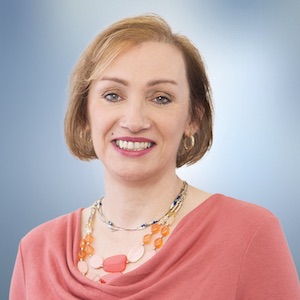
About the Author
Janet Kiss is a Membership and Corporate Sales Associate at PartnerMD and is available for one-on-one and/or roundtable conversations for VA Council of CEO Members.
Editors Note: PartnerMD is a Sponsor of Virginia Council of CEOs.
VACEOS Members Make INC 5000 Fastest-Growing 2021 List

The VACEOs community is made up of CEOs from some of the fastest-growing businesses in the region. This year, 310 Virginia companies made the most recent Inc. 5000 “fastest-growing” list, including several VA Council of CEOs members who continue to make repeat appearances.
Special congratulations to those making the INC 5000 list for the first time: Justin Etheredge of Simple Thread and Paul Habenicht, of VetEvolve.
To these leaders below, we say congratulations, and well done!
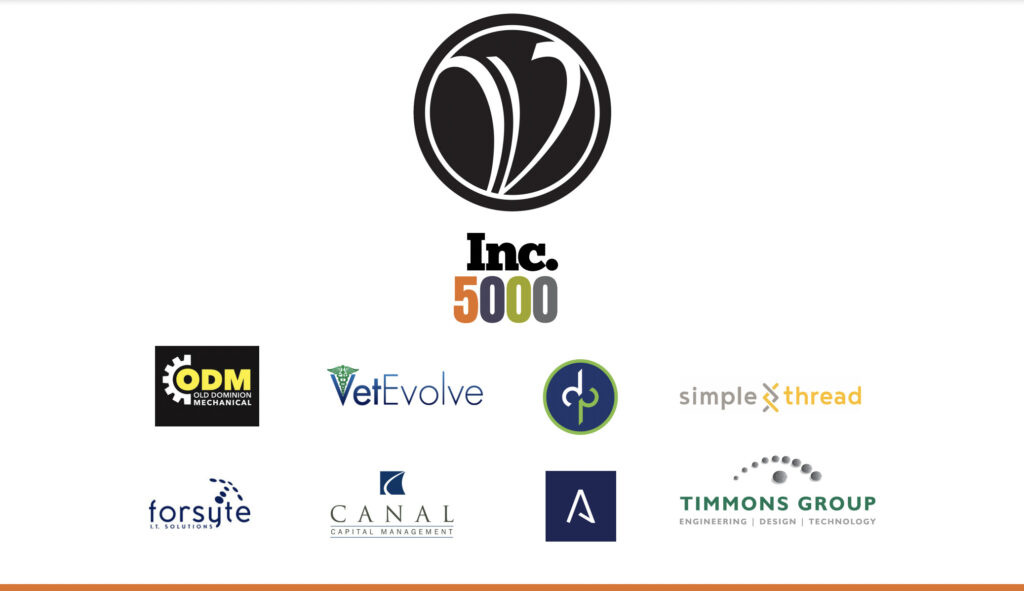
VACEOs Members Making INC. 5000 (2021)
- Brian Bortell / Timmons Group (6x Winner Inc 5000)
- Justin Etheredge / Simple Thread
- David Fratkin / Dominion Payroll (12x Winner Inc 5000)
- Neil Gilliss / Canal Capital Management (4x Winner Inc 5000)
- Paul Habenicht / VetEvolve
- Chuck McBride / Forsyte IT Solutions (2x Winner Inc 5000)
- Eddie O’Leary / COLAB (3x Winner Inc 5000)
- Jock Wheeler / Old Dominion Mechanical (4x Winner Inc 5000)
VACEOs Member Business Rankings
| Rank | Member | Company | Growth | Industry | City |
| 4,696 | Brian Bortell | Timmons Group | 52% | Engineering | Richmond |
| 2,825 | Justin Etheredge | Simple Thread | 141% | Software | Glen Allen |
| 4,509 | David Fratkin | Dominion Payroll | 59% | Financial Services | Richmond |
| 4,723 | Neil Gilliss | Canal Capital Management | 51% | Financial Services | Richmond |
| 2,264 | Paul Habenicht | VetEvolve | 188% | Health | Richmond |
| 1,455 | Chuck McBride | Forsyte I.T. Solutions | 325% | IT Management | Richmond |
| 4,466 | Eddie O’Leary | Colab Multimedia | 60% | Advertising & Marketing | Richmond |
| 1,246 | Jock Wheeler | Old Dominion Mechanical | 386% | Construction | Richmond |
3 Insights You Need To Know Before Starting A Diversity, Equity, and Inclusion Program

Taking the first steps toward a well thought out, well rounded DEI program can be difficult, confusing, and uncertain. Your best strategy is to follow the path of those who have gone before you. Below are three insights and opportunities other CEOs have identified as critical to the success of the program you are considering:
1) Have thick skin. Be willing to get uncomfortable. Listening isn’t enough. Take action!
2) Start somewhere. Don’t over-complicate and avoid taking action due to over-analysis.
3) Ask a lot of questions. Read a lot of resources.
Are you ready to start a diversity, equity, and inclusion program in your organization or improve the one you have in place? Don’t go it alone! Download our FREE report “How CEOs Are Addressing Diversity, Equity & Inclusion – Experiences, perspectives, and insights from 50+ local CEOs.”

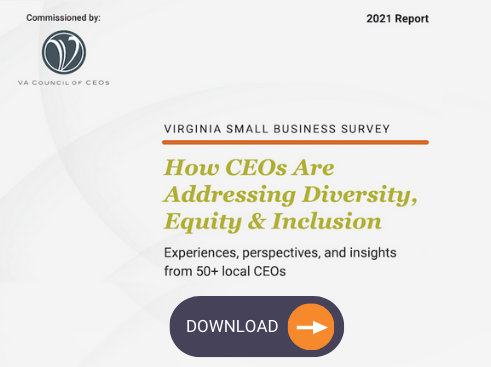
Recent Comments